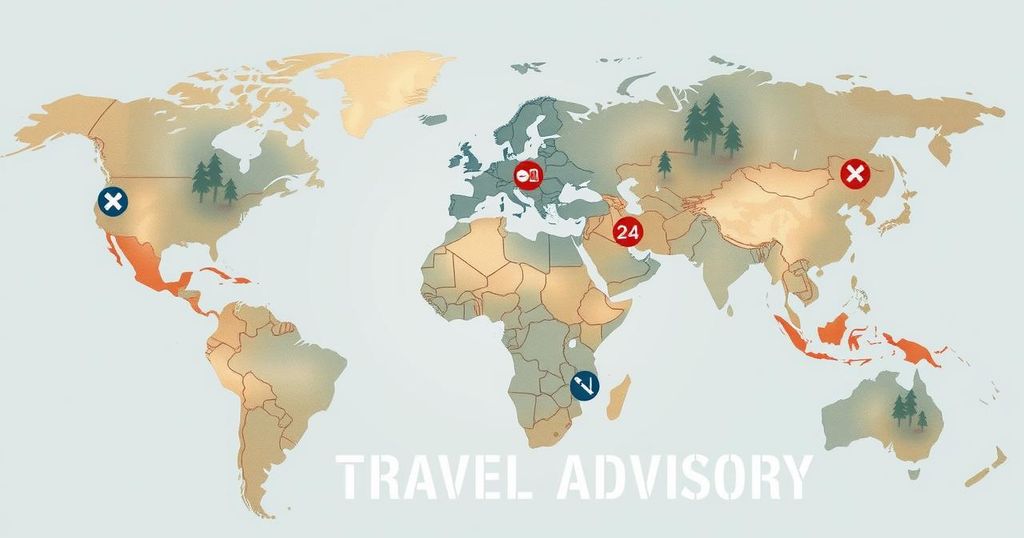South Sudan has been added to the U.S. “Do Not Travel” list due to escalating violence and crime, significantly impacting its tourism sector. This move is part of a broader trend of increasing travel risks in multiple countries, including Yemen, Venezuela, and Ukraine. The advisory is expected to lead to fewer flights and a decline in foreign investments, exacerbating economic challenges for the country.
The U.S. Department of State has placed South Sudan on its highest-risk “Do Not Travel” list, citing escalating violence, armed conflict, crime, and kidnappings. This designation limits South Sudan’s viability as a travel destination, further shrinking the global tourism map. The advisory is expected to result in reduced flight operations, unavailability of travel insurance, and decreased foreign investments in hospitality, thereby inflicting significant economic harm on the country’s already fragile tourism sector.
As global instability rises due to ongoing conflicts and violence, many nations face similar travel advisories, severely impacting their local economies and tourism sectors. South Sudan has long grappled with political instability and ethnic violence. The recent order for the departure of non-emergency personnel from the U.S. government further underscores the declining security situation in the country.
The travel advisory highlights the prevalent risks of violent crime, including carjackings, shootings, and armed robberies. Armed groups operate throughout South Sudan, with civilian access to weapons increasing the likelihood of sudden attacks on foreigners. Notably, reporting without proper authorization has led to harassment or worse for journalists in the region, effectively preventing any hope for a tourism-driven recovery in South Sudan.
Despite its potential for wildlife tourism and cultural experiences, operators in the sector are expected to face dwindling bookings. Airlines are likely to reduce or suspend flights to the region, complicating travel logistics and limiting tourist access. Consequently, tourism-related businesses, like hotels and transportation services, will likely struggle to survive.
Visitors to South Sudan are primarily aid workers, journalists, and business professionals. However, the latest advisory indicates that even these groups are now at substantial risk of violence and kidnappings. This environment may compel organizations to withdraw their personnel from South Sudan entirely.
South Sudan joins an expanding list of countries under strict U.S. travel advisories, each facing severe risks that cripple tourism and business activities. Yemen, Venezuela, Russia, Libya, Ukraine, Central African Republic, and Haiti also experience significant threats that discourage travel and tourism.
Yemen is regarded as one of the most dangerous nations due to terrorism and civil war, with American citizens lacking consular support. Venezuela’s rampant crime and political chaos lead to arrests of U.S. citizens without due process and limited embassy support. Similarly, Russia’s ongoing conflicts and hostile environment deter travel, with martial law restrictions exacerbating the situation.
Moreover, Libya remains unstable, marked by widespread violence and terrorism. Ukraine continuously faces Russian missile strikes, making tourism virtually impossible within conflict regions. The Central African Republic endures years of armed conflict, with limited U.S. assistance, while Haiti has succumbed to chaos from rampant crime and gang violence.
The increasing number of countries on the U.S. “Do Not Travel” list underscores a deteriorating global security landscape. Travelers and businesses are urged to re-evaluate their plans amid these emerging dangers, showcasing the need for the tourism sector to adapt to an evolving environment where entire nations are rendered off-limits for safe travel.
In conclusion, South Sudan’s recent inclusion on the U.S. “Do Not Travel” list amplifies the risks associated with travel in regions plagued by instability and violence. The tourism sector in South Sudan faces unprecedented challenges, including reduced flights and diminished foreign investment. As this trend spreads across various nations, stakeholders within the global tourism industry must reassess their strategies and adapt to shifting travel dynamics marked by insecurity and conflict.
Original Source: www.travelandtourworld.com






